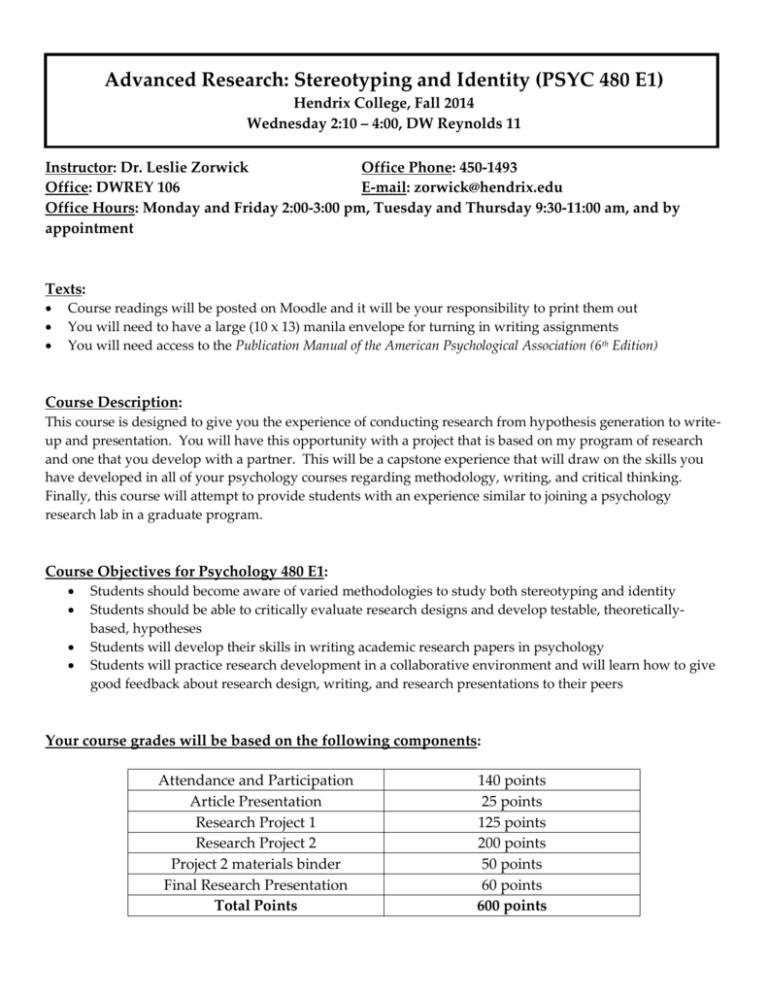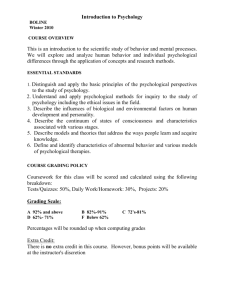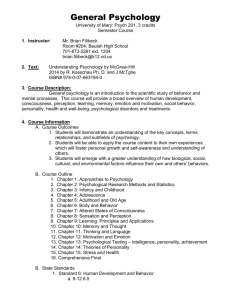Advanced Research Syllabus – Fall 2014
advertisement

Advanced Research: Stereotyping and Identity (PSYC 480 E1) Hendrix College, Fall 2014 Wednesday 2:10 – 4:00, DW Reynolds 11 Instructor: Dr. Leslie Zorwick Office Phone: 450-1493 Office: DWREY 106 E-mail: zorwick@hendrix.edu Office Hours: Monday and Friday 2:00-3:00 pm, Tuesday and Thursday 9:30-11:00 am, and by appointment Texts: Course readings will be posted on Moodle and it will be your responsibility to print them out You will need to have a large (10 x 13) manila envelope for turning in writing assignments You will need access to the Publication Manual of the American Psychological Association (6th Edition) Course Description: This course is designed to give you the experience of conducting research from hypothesis generation to writeup and presentation. You will have this opportunity with a project that is based on my program of research and one that you develop with a partner. This will be a capstone experience that will draw on the skills you have developed in all of your psychology courses regarding methodology, writing, and critical thinking. Finally, this course will attempt to provide students with an experience similar to joining a psychology research lab in a graduate program. Course Objectives for Psychology 480 E1: Students should become aware of varied methodologies to study both stereotyping and identity Students should be able to critically evaluate research designs and develop testable, theoreticallybased, hypotheses Students will develop their skills in writing academic research papers in psychology Students will practice research development in a collaborative environment and will learn how to give good feedback about research design, writing, and research presentations to their peers Your course grades will be based on the following components: Attendance and Participation Article Presentation Research Project 1 Research Project 2 Project 2 materials binder Final Research Presentation Total Points 140 points 25 points 125 points 200 points 50 points 60 points 600 points Final grades will be based on the following basis and I will *not* round up grades: A B C 90% and above 80-89% 70-79% D F 60-69% 59% and below Attendance and Participation (140 points): Because our class only meets once a week, you are expected to attend. We will only have 14 class meetings, so each class is essential to your understanding of my research, your development of your own research, and your ability to help each other. If there are circumstances that will require you to miss class, I expect you to let me know as soon as possible so that we can make arrangements, but missing class will put you at a disadvantage and will affect your grade. You will be assigned participation points (ranging from 0-10) for each class session. I expect you to come to class and be able to demonstrate a clear understanding of the week’s reading through questions and comments that thoughtfully engage the material. There will be no hiding out in this class – I expect every one of you to be talking in each class session in a way that is productive for the class discussion. If you are late for class, it will result in an automatic three point deduction from your participation score because you have less time to participate and you will be actively disrupting other people’s classroom experience. Article Presentation (25 points): I will assign foundational papers in stereotyping an identity, but it will be your job to keep each other up to date on the literature. Depending on your primary interest in either stereotyping or identity, you will find and present one article from 2013-present to present to the group during either Week 5 or 6. I expect you to provide a succinct, well prepared, oral summary and a handout. I also expect you to raise questions based on the research findings and to connect this to your own research ideas. You will get more detailed guidelines as this assignment approaches. Research Project 1 (125 points): You will first assist in a project related to my program of research in stereotyping and identity, specifically in the area of perspective taking. We will make some methodological decisions as a group and you will be responsible for collecting data, entering data, analyzing the complete data set, and writing up the project. More specific guidelines for this paper will follow. But, your grade will be a function of the individual sections and will be broken down as follows: Introduction and Methods – 20 points Results – 15 points; Stats consultation required for full credit (no consulting will lower grade by 50%) Discussion – 20 points Final Paper – 70 points Research Project 2 (200 points): The second course project will involve teams of two students coming up with their own research project that is related to stereotyping, identity, or both. The team will present research ideas to the class and will get feedback on your methodology. Each team’s project must be approved by me. You will be responsible for collecting, entering, and analyzing data, as well as writing a paper based on the project. More specific guidelines for this paper will follow. But, your grade will be a function of the individual sections and will be broken down as follows: Abstract – 20 points Introduction – 20 points Methods – 20 points Results – 20 points; Stats consultation required for full credit (no consulting will lower grade by 50%) Discussion – 20 points Final Paper – 100 points Project 2 study materials binder (50 points): The purpose of keeping a lab notebook is to help you keep track of all the nitty-gritty details of your experiment and provide a permanent record of your work. The reason for this is to make sure that another person could repeat exactly what you did. And, this binder will allow you to document the rationale for your methods, and any important observations that come up in conducting your research, so that you would have all necessary information when writing up your work for publication. More specific guidelines for this assignment will follow. But, your grade will be a function of the individual sections and will be broken down as follows: Background section – 10 points due by Friday, November 7th Methods section – 10 points due by Friday, November 14th Results – 10 points due by Friday, November 21st Wrap up and revisions – 20 points due by Wednesday, December 17th Your lab notebook must be complete, logical and easy to follow to anyone. In other words, assume no prior knowledge of your experiment. Document and explain everything. Memory is unreliable, so this notebook will serve as a full and complete record of your project from start to finish. NOTE: if you do not submit ALL of your materials for your notebook and address all questions by December 17th, you may receive an “Incomplete” for the course until all materials are received. Final Research Presentation (50 points): During the time allotted for our final exams, I will ask each research team to give a 20 minute research presentation based on your research project. It will be important that each member of the team talk for 10 minutes. You will receive detailed instructions as the time nears, but your grade will have two components. 20 points will be assigned for a Presentation Plan that you will give to me that is an outline of your talk or completed slides. It will be due on November 25th (before Thanksgiving) and you will have to come and meet with me the following week so that I can give you feedback. 40 points will be assigned for your portion of the actual presentation and you will provide me a copy of your slides (6 per page) as well as an APA style citation sheet. Late Assignments: It is your responsibility to turn in all assignments on time. In this course, there are several assignments that will be shared with all members of the class, so your lateness will affect your classmates in most instances. All assignments will be due at the beginning of class. If you have a documented extracurricular commitment that prevents you from turning an assignment in on time, I expect you to turn in the assignment early. Late assignments will incur a 20% grade reduction per day they are late. Extensions will only be given in the case of a documented emergency and you will need to let me know as soon as possible. Academic Misconduct: Academic dishonesty in any form—e.g., cheating on an exam or plagiarism—will not be tolerated. In this course, although you will be working on similar assignments, with the same data, individual students must write their own paper assignments. Collaborative writing will be treated as cheating unless explicitly allowed by the instructor. In general, acts of academic dishonesty on any assignment will result in a grade of “0” for that assignment. Also, in accordance with College procedures, all instances of academic dishonesty will be referred to the Academic Integrity Board. Accommodations for Students with Disabilities: It is the policy of Hendrix College to accommodate students with disabilities, pursuant to federal and state law. Students should contact Julie Brown in the Office of Academic Success (501-505-2954; brownj@hendrix.edu) to begin the accommodation process. Any student seeking accommodation in relation to a recognized disability should inform the instructor at the beginning of the course. Several important notes: Please, please come to me if you are having any kind of trouble with the course! And, feel free to check in with me regularly about your research projects! Please check your Hendrix email account daily. I will often send out important messages about changes in office hours, scheduling, tips for writing, and anything else I can think of. And, this will be your primary contact information for any research participant questions. **Please note that the schedule may change** Topics Week 1 Aug. 27 Project 1 background lecture Readings for Discussion and Class Activities Out of class work Jordan, C. H., & Zanna, M. P. (1999). How to read a journal article in social psychology. In R. F. Baumeister (Ed.), The Self in Social Psychology: Essential Readings (pp. 461-470). Philadelphia: Psychology Press. Gray, K. & Wegner, D. M. (2013). Six guidelines for interesting research. Psychological Science, 8(5), 549-553. Week 2 Sept. 3 Perspective Taking Methodology Galinsky, A. D., Magee, J. C., Inesi, M. E., & Gruenfeld, D. H. (2006). Power and perspectives not taken. Psychological Science, 17(12), 10681074. DVs for Project 1 Galinsky, A. D., Magee, J. C., Rus, D., Rothman, N. B., & Todd, A. R (2014). Acceleration with steering: The synergistic benefits of combining power and perspective-taking. Social Psychological and Personality Science, 5(6), 627-635 Bring 1 IV idea and 2 DV ideas for Project 1 Goldstein, N. J., Vezich, S., & Shapiro, J. R. (2014). Perceived perspective taking: When others walk in our shoes. Journal of Personality and Social Psychology, 106(6), 941-960. Week 3 Sept. 10 Identity Brewer, M. B. (1991). The social self: On being the same and different at the same time. Personality and Social Psychology Bulletin, 17, 475-482. Data Collection for Project 1 Leonardelli, G. J., Pickett, C. L., Joseph, J. E., & Hess, Y. D. (2011). Optimal distinctiveness in nested categorization contexts: Moving from dueling identities to a dual identity. In R. M. Kramer, G. J. Leonardelli, & R. W. Livingston (Eds.), Social Cognition, Social Identity, and Intergroup Relations: A Festschrift in Honor of Marilynn B. Brewer (pp. 103-125). New York, NY: Psychology Press. Hugenberg, K, & Bodenhausen, G. V. (2004). Category membership moderates the inhibition of social identities. Journal of Experimental Social Psychology, 40, 233-238. Week 4 Sept. 17 Stereotyping North, M. S., & Fiske, S. T. (in press). Social categories create and reflect inequality: Psychological and sociological insights. In J. Cheng, J. Tracy, & C. Anderson (Eds.), The Psychology of Social Status. New York: Springer. Galinsky, A. D., Wang, C. S., & Ku, G. (2008). Perspective-takers behave more stereotypically. Journal of Personality and Social Psychology, 95(2), 404-419. Wang, C. S., Ku, G., Tai, K., & Galinsky, A. D. (2014). Stupid doctors and smart construction workers: Perspective-taking reduces stereotyping of both negative and positive targets. Social Psychological and Personality Science, 5(4), 430-436. Data Collection for Project 1 Topics Week 5 Sept. 24 Identity Article Presentations Readings for Discussion and Class Activities Hodges, A. J., & Park, B. (2013). Oppositional identities: Dissimilarities in how women and men experience parent versus professional roles. Journal of Personality and Social Psychology, 105(2), 193-216. Out of class work Project 1 Intro and Methods DUE Data files DUE Tarrant, M., Calitri, R., & Weston, D. (2012). Social identification structures the effects of perspective taking. Psychological Science, 23(9), 973-978. Week 6 Oct. 1 Stereotyping Article Presentations Sinclair, S., Hardin, C., & Lowery, B. (2006). Self-stereotyping in the context of multiple social identities, Journal of Personality and Social Psychology, 90, 529-542. Data analysis approval DUE by Friday, October 3rd Todd, A. R., Bodenhausen, G. V., Richeson, J. A., & Galinsky, A. D. (2011). Perspective taking combats automatic expression of racial bias. Journal of Personality and Social Psychology, 100(6), 1027-1042. Week 7 Oct. 8 Week 8 Oct. 15 Discuss Project 2 ideas Schwarz, N. (1999). Self-reports: How the questions shape the answers. American Psychologist, 54, 93-105. Survey Monkey and MediaLab Tutorials Biernat, M. (2003). Toward a broader view of social stereotyping. American Psychologist, 58, 1019-1027. Discuss Project 2 hypotheses and methods Vorauer, J. (2013). The case for and against perspective-taking. Advances in Experimental Social Psychology, 48, 59-115. Project 1 Results DUE Project 1 Discussion DUE Prepare and present Project 2 idea handouts (NOTE: these must reference two new articles of your choosing from an approved journal) Week 9 Oct. 22 Project 2 IRB work and pilot testing for materials Discuss IRB process and bring forms for peer review Project 1 Final Paper DUE Project 2 Summary DUE, including 2 brief (1/2 page) article summaries Individual meetings with Dr. Zorwick Week 10 Oct. 29 Collect Project 2 Data Project 2 IRB forms due Week 11 Nov. 5 Collect Project 2 Data Project 2 Introduction Due Week 12 Nov. 12 Finishing Collect Project 2 Data Discuss Data Analysis and writing up Results Project 2 Methods Due Week 13 Nov. 19 Analyze Project 2 Data Stats Consultations Project 2 Results Due Discuss the Discussion section of papers Week 14 Nov. 26 NO CLASS – Thanksgiving Southwestern Psychological Association Conference Submissions Due by 11/30 (www.swpsych.org) Abstract and Presentation Plan Due by Tuesday 11/25 Topics Week 15 Dec. 3 Final Exam Dec. 17 Wrap up Project 2 Readings for Discussion and Class Activities Research Q & A; Discuss Psychology Conferences and Presentations Out of class work Individual meetings about Research Presentations Project 2 Discussion Due Research Presentations 8:30-11:30 AM, same room Project 2 Final Paper Due Project 2 materials binder – wrap up and revisions due




